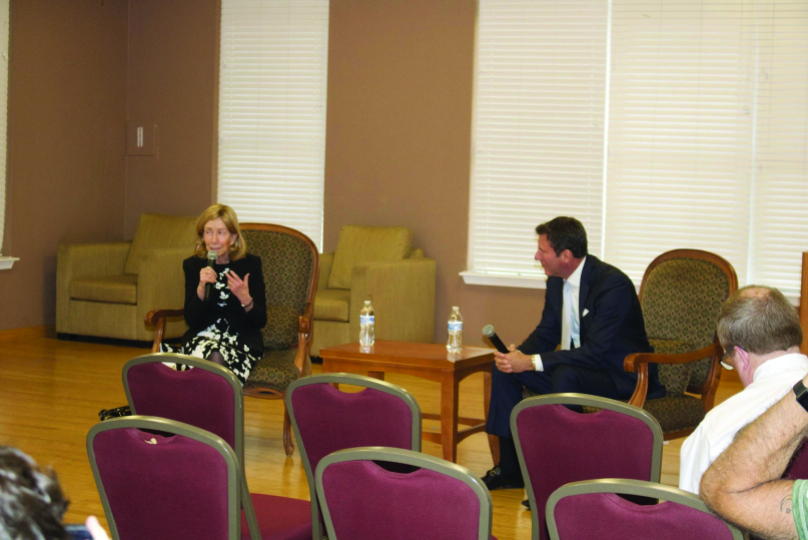Bryan Series Q&A illuminates Doris Goodwin’s work
On Tuesday, Nov. 22, students, faculty, staff and community members gathered in the Community Center and waited in anticipation for a chance to pose questions to presidential scholar, biographer and historian Doris Kearns Goodwin. Her 4 p.m. appearance on campus preceded her Bryan Series talk at the Greensboro Coliseum that night.
Goodwin was accompanied by her colleague Mark Updegrove, well known as a historian in his own right Updegrove introduced himself and Goodwin, revealing that he was a two-year student at Guilford College before transferring to a larger school.
Updegrove said he was “both excited and honored” to be back at the college that made such an impression on him. Then President Jane Fernandes spoke, giving a brief overview of the biographer’s educational background and what Fernandes described as a “great love of the liberal arts.”
During the campus event, the crowd had a wide variety of questions for Goodwin, ranging from how she became a presidential historian to what problems technology poses for presidential record-keeping.
Goodwin spoke of her childhood love of history, spurred on by a succession of great history teachers leading all the way up to her constitutional law professor, who advised her Ph.D. at Harvard University. Goodwin wound up serving first as a White House Fellow and then as a member of the 36th U.S. President Lyndon B. Johnson’s staff around the same time that she was completing this degree, a time split which she said caused some friction as Johnson tried to convince her to become his biographer later on.
The assembled group had a few different questions about Goodwin and Johnson’s relationship, including Goodwin’s first impressions of the man she called “truly larger than life.”
During a dance at the White House, the 6-foot-4 Johnson, towering over the petite Goodwin, told her—in what Goodwin called his irresistible and charismatic “Johnson treatment” style— “You’re going to work for me here at the White House.”
White House Fellows are not granted jobs on a presidential staff automatically, since the position serves as a sort of internship, so Goodwin knew this was a chance not many people get. And as she developed a closer relationship with Johnson, she found herself drawn to this man who had a certain “indomitable will.”
Goodwin fondly reflected on the day she and Johnson agreed that she would take the position.
“On that last day (Johnson) was in office before handing the presidential power over to Nixon, he called me into his office and said rather gruffly ‘All right, part time,’” said Goodwin. “And that’s how I became his biographer.”
Both Goodwin and Updegrove spoke of Johnson as a complex, compassionate man who was troubled at times and haunted by the Vietnam War.
“He knew he wanted to be remembered by his work as a president with the civil rights activism of the time,” said Goodwin. “And even later on, his work with the Great Society. (The Vietnam War) was just something I knew he always regretted being handed––it was this huge mark on his presidency. But that’s a lot of presidents… Bush (Jr.), for one.”
Goodwin also spoke to the potential trouble biographers run into balancing a historical figure, particularly one they may have known personally, as a “character,” versus writing about someone as a real person. Both Updegrove and Goodwin praised actor Bryan Cranston’s recent portrayal of Johnson in the 2016 film “All the Way.” During the filming, Cranston sought Goodwin’s help since she worked as the film’s historical consultant.
“There is this temptation to fill in the gaps with what a person was thinking, what he was really meaning, but you can’t assume that unless it’s official record…” said Goodwin. “I think that’s where film can come in and fill those gaps, make that person into a character the audience can empathize with.”
Goodwin reassured the students in the audience that her path to presidential historian was not straightforward. However, she also said she was pleased with her life choices and what paths she had taken. She encouraged those present to seize once-in-a-lifetime opportunities when they arise.
“Looking back I am so glad I made that choice to say yes,” Goodwin said. “It would have been so foolish of me (to refuse the offer by Johnson), but you don’t think of those opportunities as life-changing then. You’re young and everything is about right now.”








